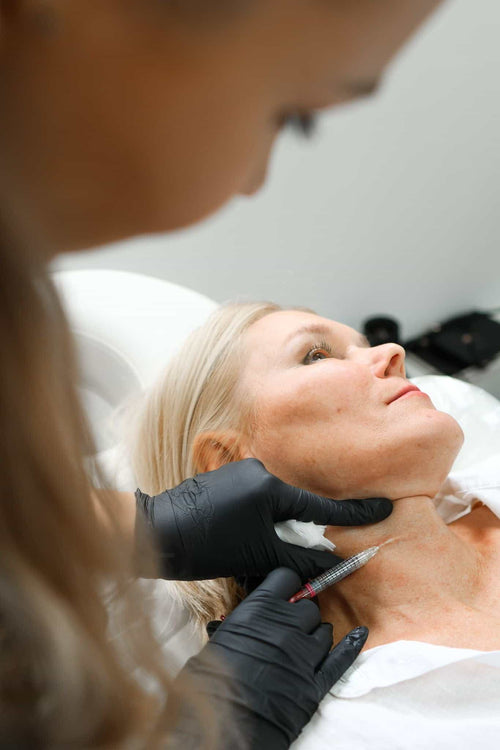Book Your Dermal Filler Appointment with Dr. Laura Geige Now
## The Anatomy of Swelling
Swelling after lip fillers, or any injection for that matter, is a common and normal part of the healing process. It’s not unique to lips.
Book a Dermal Filler Session with Dr. Laura Geige Today
Here’s a breakdown of why swelling occurs and how it relates to lip filler injections:
**The Body’s Inflammatory Response:**
When any foreign substance, like dermal fillers, is introduced into the body, our immune system kicks into gear. This triggers an inflammatory response designed to protect us.
**Histamine Release:**
One key player in inflammation is histamine. This chemical causes blood vessels to dilate (expand), leading to increased blood flow to the area. This brings white blood cells and other immune system components to fight off any perceived threat.
**Fluid Leakage:**
The dilated blood vessels become more permeable, allowing fluid to leak out into the surrounding tissue. This is what causes swelling – essentially, an accumulation of fluid in the area.
**Lymphatic Drainage:**
The lymphatic system plays a vital role in removing excess fluid and waste from tissues. During the inflammatory process, the lymphatics work overtime to clear away this fluid buildup, which contributes to the swelling gradually reducing.
**Timing of Swelling:**
Swelling typically peaks within the first 24-48 hours after lip filler injections. It then gradually subsides over several days or even weeks, depending on factors like the amount of filler used and individual healing rates.
**Morning Swelling?**
It’s not unusual for swelling to appear more pronounced in the morning. During sleep, we tend to lie in one position, which can cause fluid to pool in that area.
Remember: If you experience excessive or concerning swelling after lip filler injections, consult your injector immediately.
How Fillers Work
Blood Vessel Reactions
Water Retention
## The Overnight Effect
Water retention, often called fluid retention, is a common phenomenon where excess water builds up in the body’s tissues.

This can lead to swelling, puffiness, and bloating, particularly noticeable in areas like the face, hands, feet, and ankles.
The overnight effect you see with lip fillers is primarily due to this natural water retention process.
Here’s a breakdown of what happens:
- Filler Placement: When lip filler is injected, it sits within the dermal layer of the skin. This gel-like substance plumps up the lips and creates volume.
- Body’s Inflammatory Response: The body recognizes the filler as a foreign material, triggering a mild inflammatory response.
- Increased Blood Flow & Fluid Movement: This inflammation causes increased blood flow and fluid movement to the injected area. This is your body’s attempt to heal and flush out any irritants.
- **Overnight Accumulation:** During sleep, gravity pulls fluids downward. When you lie down flat, this can cause more fluid to accumulate in the lower parts of your face, including the lips.
Factors Influencing Overnight Swelling:
- **Hydration Levels:** Drinking a lot of water before bed can exacerbate swelling.
- **Sodium Intake:** Consuming salty foods also increases fluid retention.
- **Medications:** Certain medications like corticosteroids or blood pressure drugs can contribute to water retention.
- **Allergies:** Allergic reactions to the filler can cause more significant swelling.
The good news is that this overnight swelling is usually temporary and subsides within 24-48 hours as your body processes the filler and the inflammatory response diminishes.
Fluid Shifting During Sleep
Gravity’s Role
## Tips for Minimizing Morning Puffiness
Gravity plays a significant role in morning puffiness, particularly in the face and eyes.
Arrange a Dermal Filler Appointment with Dr. Laura Geige
Throughout the night, while we sleep, fluids naturally shift due to changes in body position and lymphatic drainage.
When lying down, gravity pulls fluids downwards, causing them to accumulate in lower areas of the face like the under-eye area and lips.
This accumulation can manifest as swelling, making the face appear puffy.
Tips for Minimizing Morning Puffiness
- Elevate your head while sleeping: Sleeping with an extra pillow or two can help reduce fluid buildup in the face by encouraging drainage.
- Stay hydrated: Drinking plenty of water throughout the day can help flush out excess fluids and minimize puffiness.
- Avoid alcohol and salty foods before bed: Alcohol and salt can contribute to fluid retention, making puffiness worse.
- Cold compress: Applying a cold compress or ice pack wrapped in a towel to the puffy areas for 10-15 minutes can help constrict blood vessels and reduce swelling.
- Facial massage: Gentle lymphatic drainage massage around the eyes and face can help promote fluid circulation and reduce puffiness.
- Get enough sleep: Adequate sleep allows your body to naturally regulate fluids and minimize overnight buildup.
Optimal Placement for Minimal Swelling Cold Compresses and Elevation
Hydration and Lifestyle Factors
Lottie London Aesthetics Alabama Sig Delt Goonie Yoga and Therapy Democracy Defense Coalition
- Sculptra Surrey – Collagen Stimulation Therapy Near Albury, Surrey - November 11, 2025
- Why CBD Gummies Are An Effective Way To Manage Pain Naturally - November 10, 2025
- What Is The Best Filler To Lift Neck? - November 7, 2025
